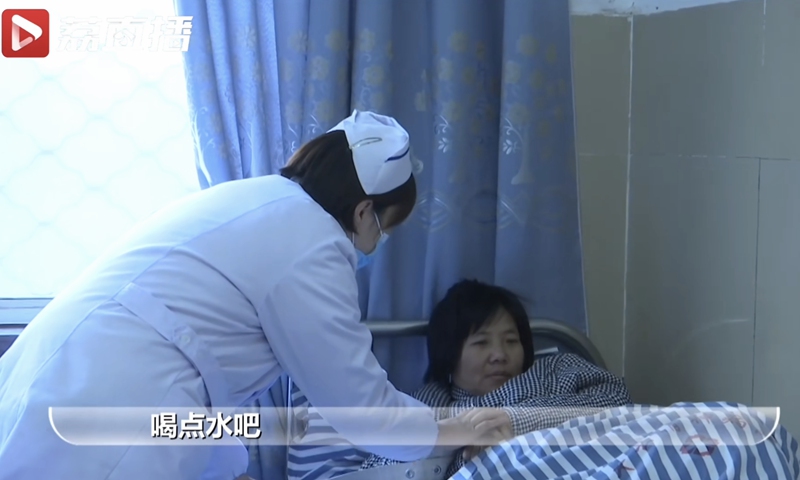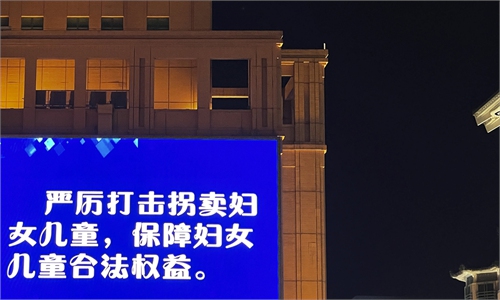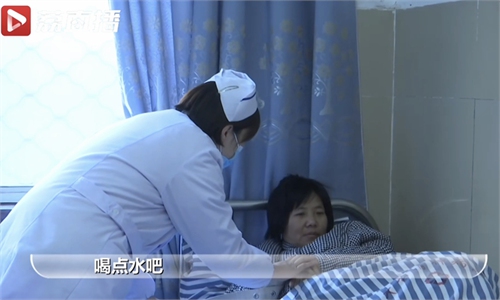Time to 'scrape poison off the bone’ after tragic woman trafficking case
Mandatory reporting system, severe punishment on buyers suggested

The victim, a woman surnamed Yang, of a human trafficking case in Xuzhou, East China's Jiangsu Province, receives treatment in hospital. Photo: A screenshot from Sina Weibo
The government of East China's Jiangsu Province concluded the controversial and tragic case of a trafficked woman in the city of Xuzhou, but the aftermath has just started, as the case led Chinese society to reflect thoroughly on the root causes and solutions to the problem of women trafficking: it is time for local governments to scrape the poison off the bone.
Several Chinese lawmakers and political advisors have made detailed suggestions and are ready to propose them at upcoming two sessions. Many called for a nationwide survey and mapping of women and children who were trafficked and severe punishment for people involved, especially the buyers as the severity of their criminal behaviors has been underestimated for a long time.
Zhu Zhengfu, a member of the National Committee of the Chinese People's Political Consultative Conference (CPPCC), suggested that China should launch an all-round program to solve the problem of human trafficking and the most urgent thing is to immediately conduct a comprehensive survey and mapping of women and children who may be trafficked nationwide and rescue them.
Jiangsu has launched a special campaign to crack down on violations of the rights of women, children and people with mental issues or disabilities.
Buying and trafficking women is a crime, but in many places it has not been treated as a crime, Zhu said, noting that in terms of law, local authorities should take the responsibility to make sure that every criminal gets punished.
"We should trust in and rely on local authorities. If they can deal with a health crisis as disastrous as COVID-19, they would also be able to solve the problem of women trafficking," Zhu said.
Heads of villages and towns should shoulder the responsibility of tackling local women trafficking problems as they are familiar with the local situation, Zhu said.
Huang Qi, also a member of the CPPCC National Committee and deputy president of the Shanghai Women's Federation, suggested the establishment of a mandatory reporting system, which requires workers at departments like county- and village-level security stations, schools, hospitals and women's associations to inform local police if they find women or children allegedly being trafficked.
Punishment for purchasers should be raised to the same level as for the traffickers, with the death penalty as the highest. And punishment for different offenses should be combined, Huang suggested.
The crime of human trafficking is similar to the crime of bribery. It is not a one-sided issue, so it is reasonable that the purchasers should receive the same punishment as the traffickers, a lawyer told the Global Times on condition of anonymity.
The issue is also closely related to many social factors like economic development levels, population quality, gender ratios and folk customs, the lawyer said, noting that the root of solving the problem is to develop local economies and increase population quality.
Fan Yun, a deputy to the National People's Congress in Shanghai, also submitted a proposal to revise laws on abducting and trafficking women and children. One of Fan's suggestions is to sentence the purchasers and the traffickers with identical crimes, which many other deputies in the city also support.
Since December 24, 2021, the revision of the Chinese Law for Protection of Women has been open to public suggestions and has received more than 420,000 comments in less than one month.
Human trafficking often happened in some poor areas in the last century, but it has become rare these days as the country has eradicated extreme poverty. However, the case in Fengxian, Xuzhou, reminds and warns society that history has not ended, and there are still women and families suffering from human trafficking.
Chinese observers noted that the greatest significance of the case is not only to free this woman in Fengxian from her chains, but to promote the eradication of women trafficking in the country.
The problem is related to the long-existing myth of female inferiority, as Chinese people usually purchase women to carry on the family line, they said.
China included the crimes of abducting and trafficking women and children in the Criminal Law in 1997. Between then and March 2019, nationwide courts dealt with more than 15,000 related cases, including 14,000 crimes of abducting and trafficking women or children and about 900 crimes of purchasing trafficked women or children, according to a report on chinalawinfo.com.
Central China's Henan Province, East China's Shandong Province, Southwest China's Yunnan Province and East China's Fujian Province are the top four areas that have reported the largest number of women and children trafficking crimes, according to the report.
Lawmakers and political advisors called for practical implementation of the country's 10-year action plan to combat human trafficking by completing an effective mechanism to prevent and crack down on crimes, and rescue and re-settle victims. Big data and artificial intelligence should be used to eradicate the buyer's market and make it a social consensus to crack down on and report human trafficking.




